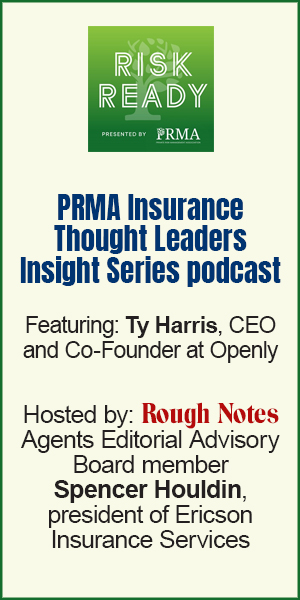 Playing the “dating game”
Playing the “dating game”
Much like dating, the art of attraction (or marketing) and curiosity (or client intake)
begin the process of deciding if the relationship is a good fit … and this impacts retention in the long run.
By Dustyne Bryant, MBA, CIC, CISR
Retention is a hot topic of education for insurance agencies and companies alike. Just what does it take to keep a client after coverage is placed? What is the secret sauce?
Here is my advice: Retention begins well before any insurance coverage is sold. It begins when a prospect and agent or agency first take interest in each other. Much like dating, the art of attraction (or marketing) and curiosity (or client intake) begin the process of deciding if the relationship is a good fit … and this impacts retention in the long run.
Attraction
Marketing for an insurance agency is strikingly similar to crafting a dating profile. Both require a clear understanding of the audience and an authentic representation of what is being offered. Just as a dating profile aims to attract a potential partner by showcasing one’s best qualities and values, an agency’s marketing efforts should highlight its strengths and unique selling points to entice prospective clients.
First impressions matter. In this stage, the agency will make itself visible through advertising, social media, website optimization, and community involvement. An agency’s website and promotional materials must be visually appealing and informative to capture interest. Authenticity is crucial, honesty builds trust, and transparency about services offered fosters reliability.
Continuous engagement is key. Just as dating involves ongoing communication to build a relationship, maintaining regular contact with clients through newsletters, social media, and personalized communications strengthens the bond and promotes long-term loyalty.
Curiosity
The initial discovery meeting or phone call with a prospective client is a lot like a first date. On a first date, individuals seek to understand each other’s personalities, values, and compatibility. Similarly, during the initial client intake, the agency and the potential client engage in a mutual discovery process to determine needs and expectations
This isn’t just about the prospect. It’s about the agency, too. The agency should take time to “qualify” the prospective client by gathering relevant insights that help the agency determine if the agency has the right coverage and services to offer and whether the client is likely to purchase coverage from them.
Qualifying questions may look something like this:
How did you find our agency? Asking how the prospect learned about it ensures that the agency gains an understanding of where its referrals come from. This will allow the agency to evaluate marketing efforts, pull marketing money away from ineffective efforts, and put it into the buckets drawing the clients in. This will also shed light on which clients are high-referral clients. Recognize that a small monoline account could be a big revenue source if that client is highly satisfied and provides name referrals.
Do you have an insurance advisor and/or why are you leaving your current one? Understanding who the prospect’s incumbent agent is (or if they even have an advisor) may provide unspoken details on why the client is leaving, especially if the agency harvests a local clientele. In addition, knowing why the prospect is leaving the incumbent agency may uncover unrealistic client expectations or ensure that any frustrations are repeated. If the prospect indicates that they shop coverage every year on principle, expect that this prospect may cause unnecessary remarkets that waste valuable agency resources.
What insurance company(ies) are you currently with and what do you like/dislike about your coverage? Similar to learning about the prospect’s incumbent advisor, learning about the insurance company that the prospect desires to leave may give the new agency details on compatibility. Is there coverage the client needs but can’t obtain with their current provider? Is the prospect dissatisfied with how a claim was handled? Note that the incumbent carrier may be a preferred insurance company with the new agency, leaving fewer options to offer the client.
What are your biggest concerns about your insurance? With this question, if coverage does not come up as one of the prospect’s concerns, the agency may be looking at a prospect solely concerned about price and, well, a client sold on price will leave on price. In addition, understanding what risks, exposures, coverage details, or service standards a prospect is concerned with will help the agency sell solutions, advocacy, and service over price.
What are your most valuable assets? Clients love to talk about what they’ve worked hard for. Taking an interest in what they are most proud of also begins to establish a connection with the client while also gathering information on property insured or missing coverage.
Tell me about any claims in the past five years. Ask about claims history as an open-ended question that requests the client’s “story” about claim details. This will not only provide a more accurate picture of the claim history but may also provide opportunities for client education on coverage or claims and ward off any unrealistic expectations should they experience a claim with a new agency.
What are your plans for the future? A prospective client profile may appear small on the surface, but a monoline auto account can turn into a full package quickly. If the agency understands the future of the client, it will understand how to grow with the client.
As the line of questioning or, better yet, conversation progresses, it will naturally shift toward building the prospect’s risk profile, which includes collecting detailed information such as demographic data, occupation, lifestyle, claims history, credit history, and more.
Continue asking questions in a conversation style, as this is generally more comfortable than grilling them with a “checklist.”
Tread lightly but confidently, as the prospect must feel they can trust you with the information they are providing. They need to trust not only that their information is secure but also that they are free from judgment.
Provide reassurance to prospective clients who are hesitant to answer more prodding questions (Social Security numbers, personal business activities, ownership arrangements, and maybe even medicinal or recreational use of cannabis in some states). Assure them that you have no judgment in the matter and that the questions are necessary to obtain accurate quotes with the right coverages to address their unique profile.

Retention through connection
Client retention is marked by the ability of an insurance agency to keep clients engaged and loyal over a period of time. It is filled with strategy of client onboarding (not to be confused with intake), service standards, technology use, communication, and more but, most important, it begins with the first “hello.”
Client retention in an insurance agency, like a lasting romantic relationship, hinges on mutual respect, ongoing communication, and a commitment to meeting each other’s needs. By fostering these qualities, an insurance agency can build enduring client relationships that stand the test of time.
So, there you have it. By marketing your agency with authenticity, making a stellar first impression, and engaging continuously, you’ll capture interest. Then, through thoughtful, engaging, and inquisitive client intake, you’ll uncover needs, build trust, and ensure compatibility all while building the prospect’s risk profile.
Keep these principles in mind, and you’ll find the secret sauce to client retention is less of a secret and more of a love story in the making!
The author
Dustyne Bryant, MBA, CIC, CISR, is the director of Risk & Insurance Education and Research, personal lines academic director, and host of the Awkward Insurance Podcast for the Risk & Insurance Education Alliance. Dustyne is licensed in P-C and L&H in Arkansas and P-C in Texas. Dedicated to personal lines insurance since 2007, she has a demonstrated strength in technical comprehension cultivated through working with a vast selection of regional, national, and surplus lines carriers as a licensed agent, account manager, and department leader. She graduated from the University of Arkansas at Little Rock, obtaining her MBA (2015), B.S. cum laude, Criminal Justice (2011), A.A., Law Enforcement (2010), and Conflict Mediation Graduate Certificate (2015). She earned her CISR designation in 2011 and CIC designation in 2012.
In her role, Dustyne collaborates with industry educators and colleagues, and other experts to deliver relevant and well-researched practical educational content to growing risk and insurance professionals.




